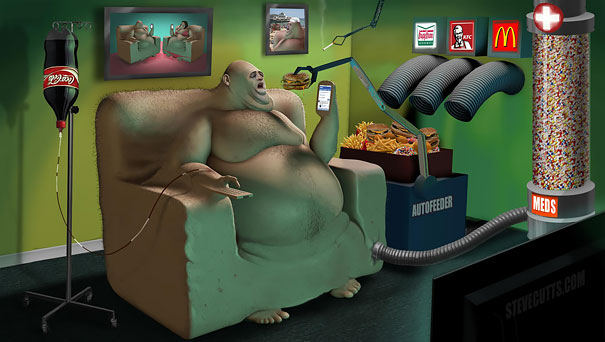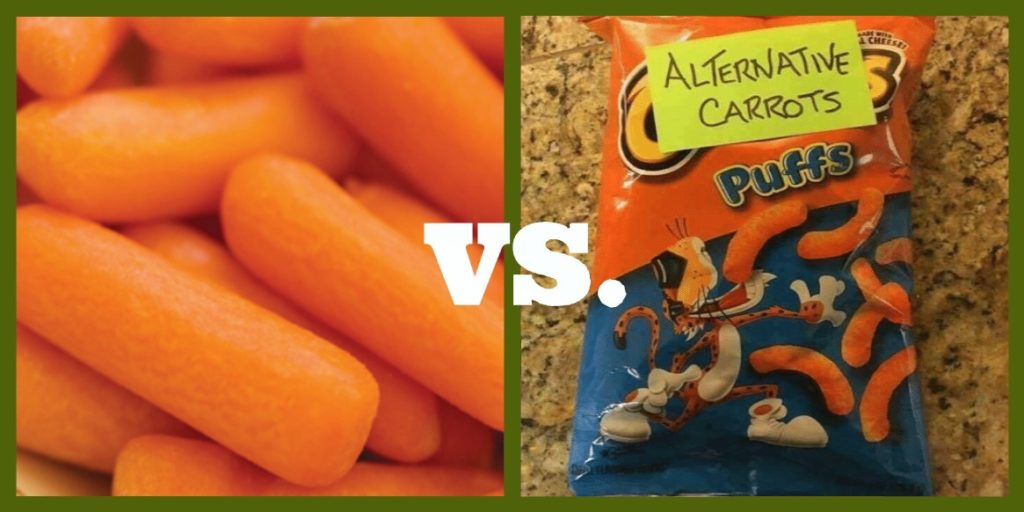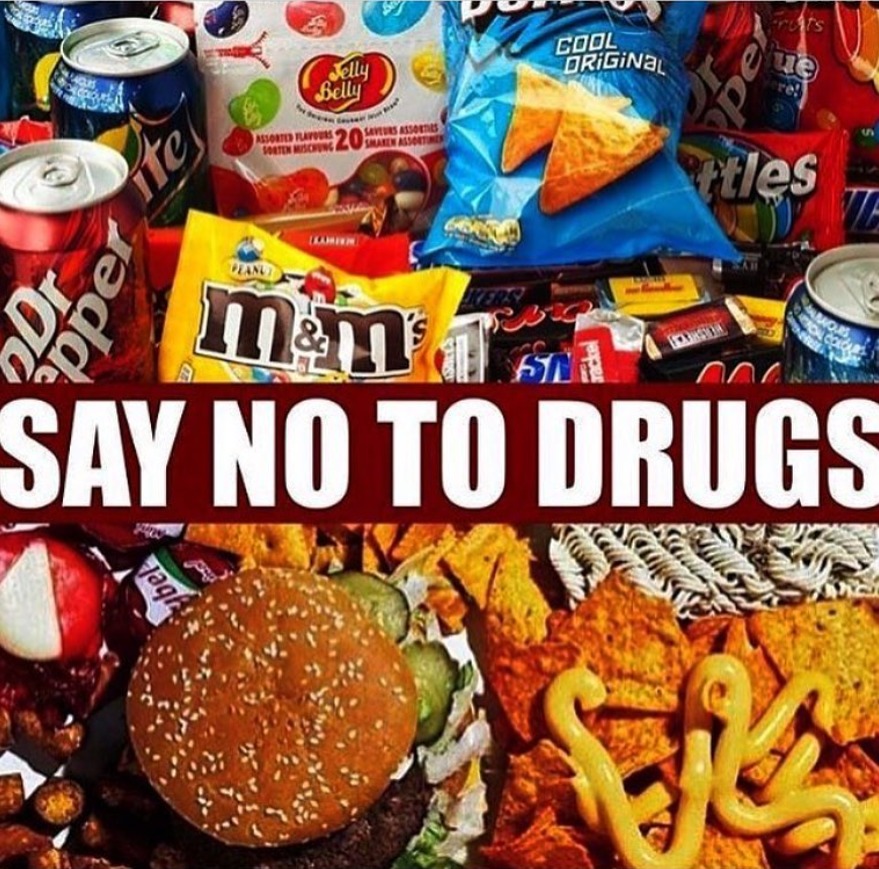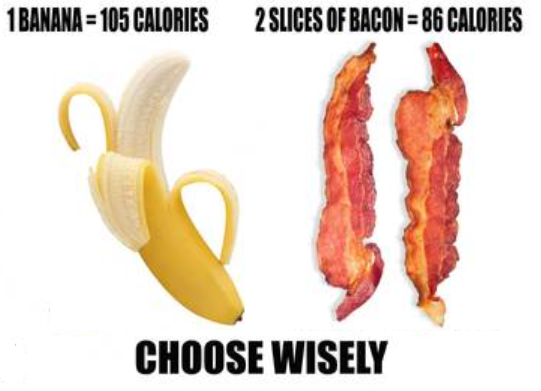Calories are units of measure that tell you how good a certain food tastes. Fudge has a high number and is very good. The low calorie celery, which is not a food at all but rather a member of the plywood family invented to get dip into our mouths, is not so delicious.
Sergio Tlacelel

Mushy pulpy mess of soggy fries washed clean by yellow fizzy liquid. Verdant crunchy fiber-like bolus scented with hairy scarlet sweetness. Calories. It’s what you eat. Are they different? Do fries act differently than raspberries? Should they be counted and why does that matter? Should we bother counting calories and meticulously stare at all the foods in front of us? How about weighing every little ounce of precious morsel that enters our mouth and subtract every calorie from the food we spilled onto the floor? Calories don’t count. Not the same way you are thinking. Humans don’t need to count calories. Bipedal animals do. Obsession is depression. Question that stressful expression. Use calories like the tool it is.
When bipedals talk about calories, it is considered the prime reason for food consumption. You cannot live unless you have enough calories. You will die if you under eat. You can die if you overeat. Why is under eating a separate word and overeating a single word? Is it to convey the message that less calories are bad and overeating is better since you won’t die of starvation? Can you die starvation if you overeat?

How much is enough?
We can have our metabolism measured to know exactly how much we use daily based on inactivity. Then proceed to only eat that much and not a number more. This will allow us to eat cheetos and never become fat all while sitting on the couch watching streams of our favorite YouTube celebrities, old reality show reruns and hilarious standup comedy. The laughter will help burn a few extra calories.
Calories in and calories out. All calories are the same there’s no doubt.
Dangerous thinking. Calories come from the macronutrients found in whatever foodstuff we are stuffing into our face at the time. Protein and carb calories are close in value while fats are more than double the amount found in protein or carbs. In fact, one serving of fat is more calorically than one serving of protein and carbs combined. Since calories are calories it doesn’t matter whether it is from cheetos or carrots, right? They both start with c like calories and if the calorie count is the same then my weight scale needle will not shift upwards. Not all calories are the same nor are all calories built the same.

Emptiness is the abyss
Empty calories are calories that give no nutrition. Soda, for example, is a liquid-like syrup that only provides carb calories. Unless you order diet, then it really is empty of anything except fleeting pleasure. Candy is no better. Most foods have some nutrition coupled in with calories, but other things like rice flour cereal must have nutrients added to it to make it “better”. These are not empty but devoid calories. Just like that ice-cold diet soda. No substance. So far not all calories are the same. There are better Caloric choices out there. We like multifunctional items. Not only eatable items.
Celery. That stalky green mass of water and fiber. Celery has 5 calories per stalk. The calorie count of celery does not consider the processing that goes into breaking down that particular foodstuff. It ignores the oral mastication, look that up, and digesting as it traverses the avenues, boulevards and sewers of the body. The number is much lower than 5. Some would say it is negative in this regard, but I would not bet your horses on it just yet.
There is a difference between all calories in terms of how the body processes them. Fat needs the least processing; therefore, its caloric numbers are still the same. Carbs need more processing than fat; therefore, its number is slightly lower. Protein is the lowest on the calorie scale needing the most work done to break it down in the body. In other words, if you have a 100-calorie package of plain jerky, plain crackers, or butter, jerky will have the lowest calories. It will be lower than 100. The butter will be the closest to 100 calories and the crackers will be somewhere in between. Ignoring nutrients present, calorically the biggest winner, or loser, is butter. Clearly not all calories are the same.

Calories in, calories out.
Time for a math game. Bodily processing not being considered, Fat is roughly 9 calories per gram. That means one tablespoon, 15 grams, of fat is about 126 calories. Protein and carbs both come in at 4 calories per gram. For the same tablespoon of protein or carbs you get 56 calories. 56 from protein plus 56 from carbs equals 112. Lower than fat, however, knowing what you know now about the processing aspect of calories, those numbers are going to be lower while the fat calorie count remains the same.
The optimist sees a donut, the pessimist sees 452 calories boiled in fat, drenched in sugar, and empty on the inside.
Sergio Tlacelel
What about deficits
Calorie deficit is mentioned as necessary to drop weight. Ever heard the adage that one pound of fat is equal to 3500 calories? This is true by weight, not by effort, however. Shedding fat is more complex than just do not eat so much and put the damn fork down. Calorie deficits carry the risk of malnutrition. Starvation is a real thing. Reducing calories is a stress on the body, especially if you do not get enough nutrients in your diet and thus require more than what you are giving yourself. Do not give yourself a budget where you end up owing debt in massive amounts. Constantly being in a red deficit can lead to issues down the road; A road with potholes.
A calorie deficit leads to a point where you overeat. Buffet for breakfast, lunch, and dinner? Yes, please! It is not the overeating that is dangerous. Although that carries its own risks. The danger lies in the signals told to your body. The signal being that food is scarce now. Overtime a calorie deficit forces the metabolism to become lower and slower. The moment food enters your mouth you gain weight. The signal you sent of food being scarce told the body that food needs to be stored because who knows when you will eat again. It was hard surviving without food. Could a calorie deficit be carried out normally? If adequate nutrition is involved, possibly.
There are diets that provide enough nutrients and are more regulatory in their calorie consumption without counting. These diets tell your body that food is adequate, not scarce. Thus, helping to prevent the rebound effect of weight gain that follows a drop in weight for most people. Not to mention, don’t track weight loss period. Obsession is a regression. There are better ways.
What about too much?
Calorie surplus has its own issues too. It is far too easy since food and “food” is overly abundant. “Food” aisles of packaged pastries and bagged chips lining stores. Candy peaking over a counter’s edge at checkout. Pizza is only a call or click away. At every corner, in every aisle, even in unexpected places like a park food is found.
Overindulging in foods allows one to become soft like the ice cream one eats and bloated like the inflatable pool toys available during summer. Giving the signal that food is abundant has its value but not while we sit around doing nothing. Not all calories are the same, not all weight gain from calorie surplus is the same. Calories from meat are different than from rice if both are matched for calorie counts. Those two differ compared to calories from bread or sugar.

Should counting calories be a thing?
Counting calories is very neurotic and complicated. It can impact social life to the point where you isolate yourself for meals because you cannot eat out with friend or have that drink you want. Unless you trust the restaurant to provide appropriate counts, you may avoid it all together. Life without drink will make you twice think or so says some alcoholic dude. Drinks cause their own issues. Drink calories are easier to obtain versus food calories. Alcohol has its own calorie process. It gets further impacted and more complicated when ordering rainbow colored sugar drinks. Alcohol calories act quite different from our other friends.
Life without drink will make you twice think.
A. Alcoholic
What to do?
What then is the best choice or way to go about things? Do not count calories. Instead eat in a way that is auto regulating. Become aware of what you eat yet eat without concern. Don’t eat liberally like a grazing cow. It means eat food that is rich in nutrition. Eat knowing that calories behave differently in the body. What you eat will react differently within you. Eat in a way that keeps you full and happy. If pounding bag of chips and puffs by the pound doesn’t satisfy your hunger, find food that does. More filling and more nutrient dense means you will eat the adequate amount daily or a little under what you need and still be fine with no stress. No two calories are the same. Rise above it.
